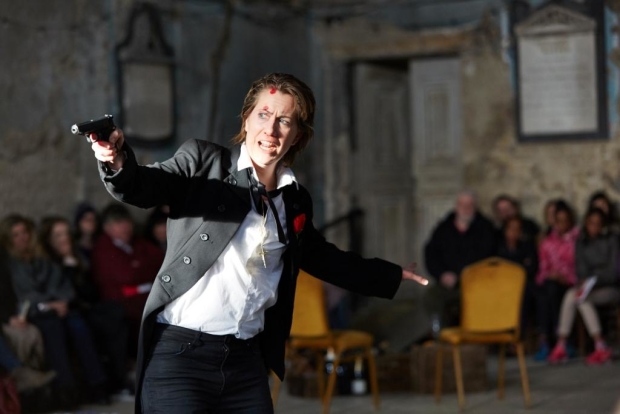Review: I Capuleti e i Montecchi (Asylum, Peckham)

© Richard Lakos
While the big boys prosper, or in some cases struggle to make ends meet, small-scale opera is on the rise. Not all of it is top-notch—Dalston’s Arcola Theatre unleashes horrors as well as gems in its under-curated Grimeborn Festival each summer—but the best work out there is not only valid, it’s valuable. Last year alone the enterprising Shadwell Opera staged rarities by Schoenberg, Turnage and Maxwell Davies.
Pop-Up Opera is one of the good guys. Its schtick is to mount flexible productions and tour them to unusual spaces, with up to 70 performances annually. Few of the company’s venues bear the word 'theatre': I caught their current project, I Capuleti e i Montecchi, when it visited the Asylum in between gigs at the Vaults and the Thames Tunnel Shaft.
The crumbling walls of Peckham’s Asylum make Wilton’s Music Hall feel like the deck of a starship. It’s the kind of 'found' building that’s grown increasingly chic in the post-Punchdrunk age, and director James Hurley‘s Tarantino-esque staging of Bellini’s opera felt right at home in its tumbledown space. Whether or not hooded hostages and Mexican standoffs are quite the thing for bel canto is another matter.
Bellini’s setting draws not on Shakespeare’s Romeo and Juliet but on earlier sources of the same story. Giulietta’s father is Capellio, her brother (Tybalt) is Tebaldo and the sympathetic Lorenzo (Laurence) is not a Friar but a family retainer. These three roles were enacted with febrile intensity by Andrew Tipple, Cliff Zammit-Stevens and Richard Immerglück, their bewilderment and barely-controlled anger all the more effective for being up close and personal to the audience.
'A golden opportunity for imaginative coloration'
Alice Privett was an even-toned Giulietta and a good foil to Flora McIntosh, who sang Romeo with extraordinary vividness. Bruised, dishevelled and determined, she was nobody’s dreamboat but a brooding, convincingly male figure of Hamlet-like darkness. The mezzo-soprano has to shoulder a substantial amount of the score, and to watch her character fall apart while she sustained a secure vocal line was thrilling.
McIntosh has been well served by a director who has battled hard to dramatise the opera’s intractable material. Alas, though, he has ended up over-egging it. No villain takes a step without lurching forward in headlong menace; no one waves a revolver without cradling it lovingly, or brandishes bone-snapping pincers without a lip-smacking grin. Yet we always know that no harm will come until the aria's finished, so their menace is bloodless. They might as well thrum their fingers while they wait.
Nevertheless it is a bold staging by Hurley that’s lit entirely by hand-held fluorescent strips and sustains high levels of physical energy against the odds. It’s deftly accompanied by musical director Berrak Dyer, a pianist whose virtuosity quickly made me forget the absence of a full orchestra. That is no great loss in Bellini, a composer whose prime concern was the voice itself.
The cast’s oversinging within a tricky acoustic was another matter. Did they devote sufficient rehearsal time to mastering the space? Intimacy is a golden opportunity for imaginative coloration, but the Asylum’s corrugated iron roof, high brick walls and bare concrete floor sent their big, relentless voices bouncing around like Flubber. No one took a knife to me but I’d swear my ears bled.
Pop-Up Opera's next performances of I Capuletti e i Montecchi are at the Thames Tunnel Shaft, Brunel Museum, on 4 and 5 April.










